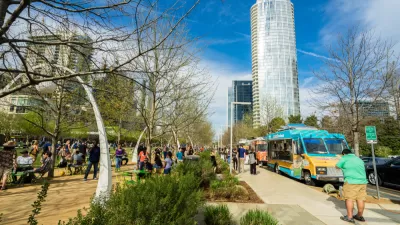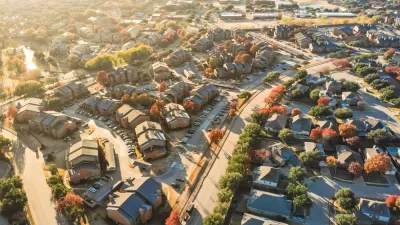The land use plan outlines ambitious goals for the city’s future, but offers little in the way of concrete changes.

In an article for Dallas Weekly, Sam Judy describes the potential of Dallas’ ForwardDallas land use plan, which is making its way to the City Council for final approval.
The proposal lays out a framework for “equity, environmental justice, and affordability for both renters and homebuyers,” but holds no regulatory power of its own.
“As the plan calls for ‘gentle density’ along transportation corridors throughout the city, single-family neighborhoods could be under threat of gentrification as middle housing such as duplexes and triplexes are integrated into neighborhoods within a mostly unregulated housing market,” Judy explains.
Critics of the plan also point out that it includes “minimal regulations on rental and housing fees” and uses a higher-than-usual base value for what qualifies as affordable housing.
A HUD representative said “ForwardDallas does not directly address affordable housing. It does recommend accommodating more housing throughout the city, where appropriate, to provide more housing options for all.” Unlike other cities, Dallas is not implementing “policies addressing the inverse drawbacks [of ForwardDallas] to ensure housing remains accessible.” Texas law complicates local housing policy, as it prohibits cities from establishing rent controls except under specific circumstances.
The plan includes some wins for environmental groups. Changes to land use in West Dallas could push out industrial development and promote cleaner commercial industry instead.
For Judy, “The goals it strives for are too general, whilst laid within a framework too loose. It states ambitions that our current city government has never meaningfully ventured toward. Dallas lacks the necessary regulation to address issues outlined in the plan, such as affordability and equity.”
FULL STORY: ForwardDallas Explained: How the Land Use Plan Can (and Cannot) Change the City

Planetizen Federal Action Tracker
A weekly monitor of how Trump’s orders and actions are impacting planners and planning in America.

Map: Where Senate Republicans Want to Sell Your Public Lands
For public land advocates, the Senate Republicans’ proposal to sell millions of acres of public land in the West is “the biggest fight of their careers.”

Restaurant Patios Were a Pandemic Win — Why Were They so Hard to Keep?
Social distancing requirements and changes in travel patterns prompted cities to pilot new uses for street and sidewalk space. Then it got complicated.

Platform Pilsner: Vancouver Transit Agency Releases... a Beer?
TransLink will receive a portion of every sale of the four-pack.

Toronto Weighs Cheaper Transit, Parking Hikes for Major Events
Special event rates would take effect during large festivals, sports games and concerts to ‘discourage driving, manage congestion and free up space for transit.”

Berlin to Consider Car-Free Zone Larger Than Manhattan
The area bound by the 22-mile Ringbahn would still allow 12 uses of a private automobile per year per person, and several other exemptions.
Urban Design for Planners 1: Software Tools
This six-course series explores essential urban design concepts using open source software and equips planners with the tools they need to participate fully in the urban design process.
Planning for Universal Design
Learn the tools for implementing Universal Design in planning regulations.
Heyer Gruel & Associates PA
JM Goldson LLC
Custer County Colorado
City of Camden Redevelopment Agency
City of Astoria
Transportation Research & Education Center (TREC) at Portland State University
Camden Redevelopment Agency
City of Claremont
Municipality of Princeton (NJ)




























